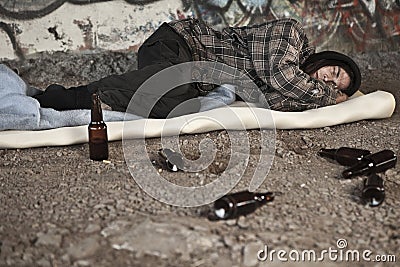Moderate drinking isn't a reason for concern in the majority of adults. However when alcohol usage gets out of control, you may be on a harmful journey towards addiction.
The National Institute on Alcohol Abuse and Alcoholism (NIAA) believes that 18 million Americans have AUD or Alcohol Use Disorders. Alcohol addiction really isn't developed right away. It manifests from extended misuse of alcohol.
Knowing the symptoms of each phase can assist you in looking for assistance before your problem becomes dependency and alcohol addiction.
Phase # 1: Occasional Abuse and drinking in binges
The first stage of alcohol addiction is a general experimentation with alcohol. These consumers might be new to various types of alcohol and are most likely to demonstrate their limits. This is a typical stage observed in young adults.
These drinkers also regularly take part in binge drinking. While they might not drink on a regular basis, they consume incredibly large amounts of alcohol at once. Most addiction specialists categorize binge drinking as:
males who consume 5 or more alcoholic beverages within two hours
ladies who consume 4 or more beverages within 2 hours
Lots of binge drinkers surpass this quantity. This is especially true for teens who participate in high school parties. You might believe binge drinking is safe if you just do it occasionally, nevertheless this could not be further from the truth.
Consuming huge amounts of alcohol at one time is hazardous, and can even lead to coma or death. You may end up being dependent on the sensation and discover that these episodes increase in rate of recurrence.
Phase # 2: Increased Drinking
Consumers leave the experimental phase when their alcohol usage ends up being more frequent. Instead of just drinking at celebrations every now and then, you might find yourself drinking every weekend.
Increased alcohol intake can also lead to drinking for these factors:
as a reason to get together with friends
to reduce stress
from dullness
to combat sadness or loneliness
Routine alcohol consumption is different from moderate drinking. There is generally a greater emotional attachment to it. A moderate consumer may pair a glass of wine with a meal, while a regular consumer utilizes alcohol to feel good in general. As enhanced drinking continues, you become more dependent on alcohol and are at risk of developing alcohol addiction.
Phase # 3: Problem Drinking
Regular, unrestrained alcohol abuse ultimately results in problem drinking. While any kind of alcohol abuse is troublesome, the term "problem consumer" describes someone who starts experiencing the effects of their habit.
You might end up being more depressed, anxious, or begin losing sleep. You might begin to feel ill from heavy drinking, nevertheless enjoy its effects excessive to care. Lots of drinkers at this phase are likewise more likely to drink and drive or experience legal troubles.
There are likewise certain social modifications associated with alcoholism. These include:
relationship problems
Because of unpredictable habits, decreased social activity
sudden change in buddies

difficulty conversing with strangers
Phase # 4: Alcohol Dependency
Alcohol addiction has 2 elements: dependency and addiction. It's possible for an alcoholic to be depending on alcohol, nevertheless not yet dependented on drinking.
Dependency forms after the problem drinking stage. Now, you have an accessory to alcohol that has taken over your regular regimen. You're aware of the negative impacts, however no longer have control over your alcohol intake.
Alcoholism also means that you have actually established a tolerance to drinking. As a result, you may need to consume bigger quantities to obtain "buzzed" or drunk. Enhanced drinking has more damaging results on the body.
Another quality of dependence is withdrawal. As you sober up, you may feel undesirable symptoms like:
queasiness (not associated with a hangover).
body tremblings.
sweating.
extreme irritation.
Stage # 5: Addiction and Alcoholism.
The final stage of alcoholism is addiction. You not wish to simply drink for enjoyment at this stage. Alcohol addiction is characterized by a physical and a mental need to drink.
http://ragingalcoholic.com/hams/
Alcoholics physically long for the drug and are typically sad until they begin consuming once again. Alcoholics may also be dependented on drugs too.
http://ragingalcoholic.com/binge-drinking-and-your-iq/
Compulsive habits are prominent in addiction, and alcoholics frequently drink whenever and wherever they want.
The Outlook.
When they don't think they have a problem, one of the greatest concerns with high-risk consumers is. Any phase of alcohol addiction is problematic. Moderate drinking is the just safe method to take in alcohol, but drinking in basic isn't safe for everyone.
Identifying problems with alcohol early can assist avoid dependence and addiction. Medical treatment may be essential to detox the body of alcohol and to acquire a new beginning. Given that lots of alcoholics endure psychological issues, individual or group therapy may assist in getting rid of addiction.
The deeper into the stages of alcoholism you go into, the tougher it is to give up drinking. Long-lasting threats of heavy drinking consist of:.
liver damage.
cardiovascular disease.
brain damage.
lack of nutrition.
mental health conditions (including enhanced threat of suicide).
If you believe you may have a drinking problem, talk to your physician.
The National Institute on Alcohol Abuse and Alcoholism estimates that 18 million Americans have alcohol disorders. Regular alcohol consumption is different from moderate drinking. As increased drinking continues, you end up being more reliant on alcohol and are at danger of establishing alcohol addiction.
Alcohol dependency likewise suggests that you have established a tolerance to drinking. Moderate drinking is the only safe way to consume alcohol, but drinking in basic isn't safe for everybody.

